Engineering has always been a field of innovation and evolution, offering exciting opportunities for those who choose it as a career path. As a fresh graduate or a college student,…
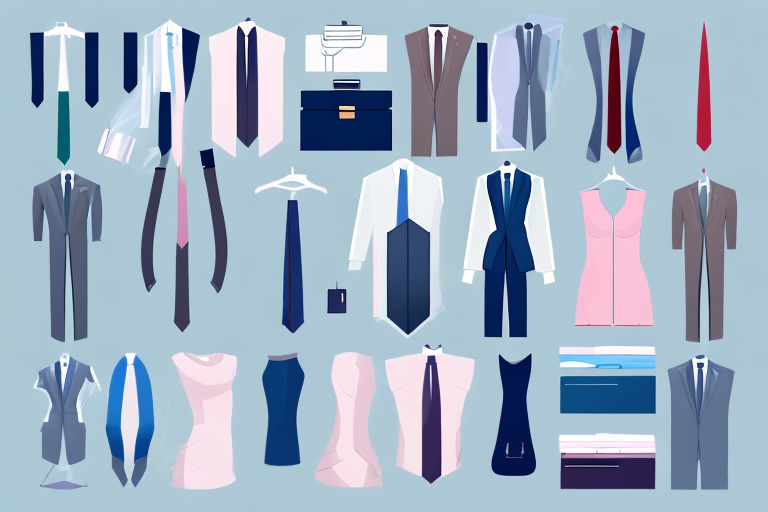
How to Dress for an Interview Formally?
Job interviews are pivotal moments in one’s career journey, especially for freshers who are eager to make a positive first impression. While your qualifications and skills are essential, your appearance also plays a crucial role in shaping the interviewer’s perception of you. This is where the concept of dress code for interviews comes into play.
In this article, we will delve into the significance of dressing appropriately for interviews, explore different types of dress codes, and provide valuable tips for both male and female candidates. So, whether you’re a recent graduate or someone seeking a career change, understanding the nuances of interview attire can give you the edge you need.
Importance of Dress Code in Interviews
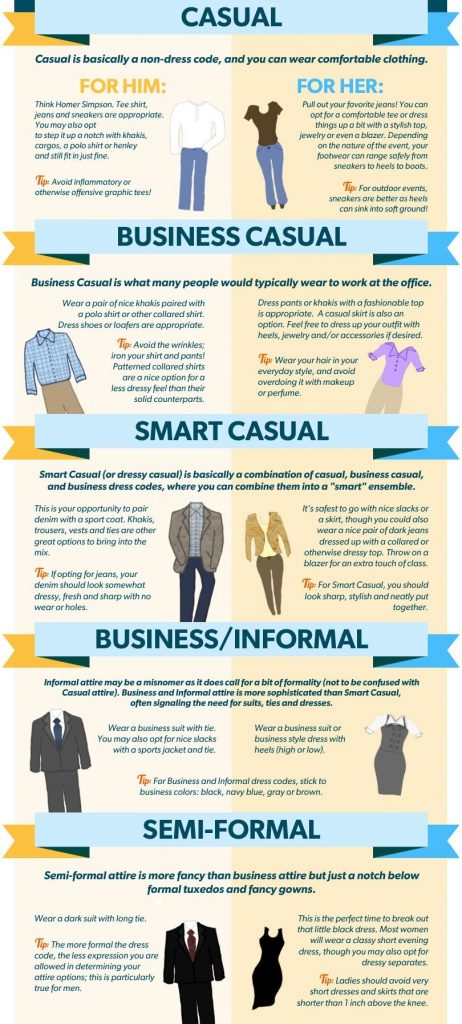
As is sometimes remarked, “first impressions are lasting impressions,” and this is especially true in the context of a job interview. Your choice of attire says a lot about how professional, meticulous, and considerate you are of the opportunity at hand. Your credibility is increased, and you show that you are aware of the expectations and culture of the company by having a well-thought-out dress code.
Dressing correctly for an interview and paying attention to the dress code rules are essential. Your appearance conveys professionalism, attention to detail, and a fit with the company’s culture, all of which make a solid first impression. You improve your chances of impressing the interviewer and enhancing the outcome of your interview by dressing appropriately. You can also go to the STAR Interview Method to be better prepared for interviews.
Remember, dressing appropriately is not about conforming but about showing your willingness to adapt and respect the norms of the professional world.
Interview Dress Code for Men
For male candidates, nailing the interview dress code involves attention to detail and a sense of style that exudes confidence and professionalism.
- Dress to Impress: When attending formal events, choose a well-fitting suit in a timeless hue like navy, charcoal, or black. Make sure the suit fits well on your body and isn’t too tight or loose.
- Shirt Selection: Choose a nice, light-colored dress shirt to go with your suit. Stay away from busy patterns and use simple stripes or plain colors instead. Always wear a white shirt.
- Tie Matters: A tie is often anticipated while wearing a suit. Pick a tie that goes well with your shirt and suit. Be cautious with your pattern and color choices.
- Shoes: You must wear polished leather shoes that match the color of your outfit. Avoid wearing sandals or shoes that are too casual.
- Grooming: Pay close attention to the little things. Make sure you have well-kept hair, clipped nails, a clean-shaven appearance, or a well-groomed beard.
Interview Dress Code for Women
Female candidates have a variety of options to create a professional and polished interview outfit.
- Dress or Suit: The traditional option is a fitted suit with a jacket, trousers, or a skirt. An excellent alternative is a well-fitted dress that ends just above the knee.
- Blouse or Top: Wear a modest blouse or top with your suit or outfit. Avoid wearing too-flashy accessories or necklines that plunge.
- Footwear: Closed-toe, low-heel pumps or flats are the best choice for footwear. Make sure your shoes are in good shape and are clean.
- Accessories: Keep them classy and modest. A simple necklace or a pair of stud earrings might offer some class.
- Hair and makeup: Go for a professional, natural makeup look. Whether you want your hair up or down, it should be well-groomed.
Different Types of Interview Dress Code For Females and Males
Dressing professionally may boost your self-assurance and make you feel more at ease throughout the interview. When you feel good about the way you appear, it may improve how well you perform overall by allowing you to express your ideas properly and highlight your skills successfully.
Understanding the varied dress rules might be a little tricky when it comes to dressing for various events. Each dress code has its own set of requirements, so you can be sure you’re dressing for the situation. Let’s examine the business professional, business casual, and casual dress codes in more detail.
Business Professional Dress Code
A business professional dress code is the standard in office settings and formal professions like law or banking. The goal of this dress code is to provide a professional and elegant appearance. It usually calls for a fitted suit in formal hues like black or navy.
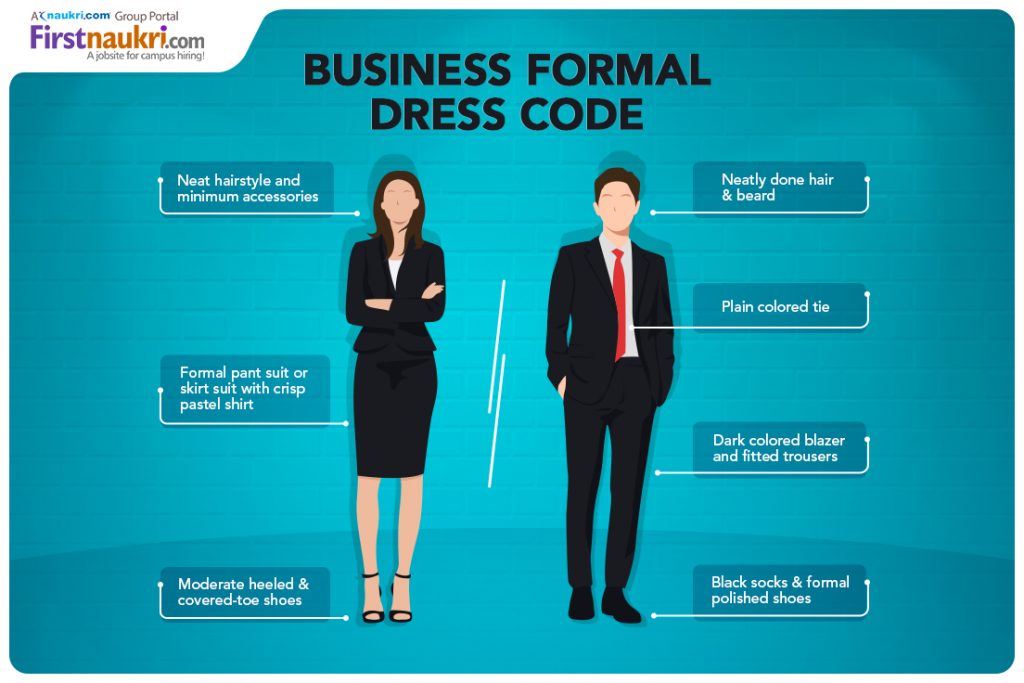
- Men should wear a formal shirt, ideally in a light color, and a tie with their suits. The outfit is finished off with shiny shoes, ideally in black or brown.
- For women, however, a closed-toe shoe with a low heel and discreet jewelry are preferred. The goal is to project authority and professionalism.
Business Casual Dress Code
Business casual is a more relaxed dress code commonly seen in industries like marketing or technology. Even though it offers more flexibility, it’s crucial to find the perfect mix between comfort and professionalism.
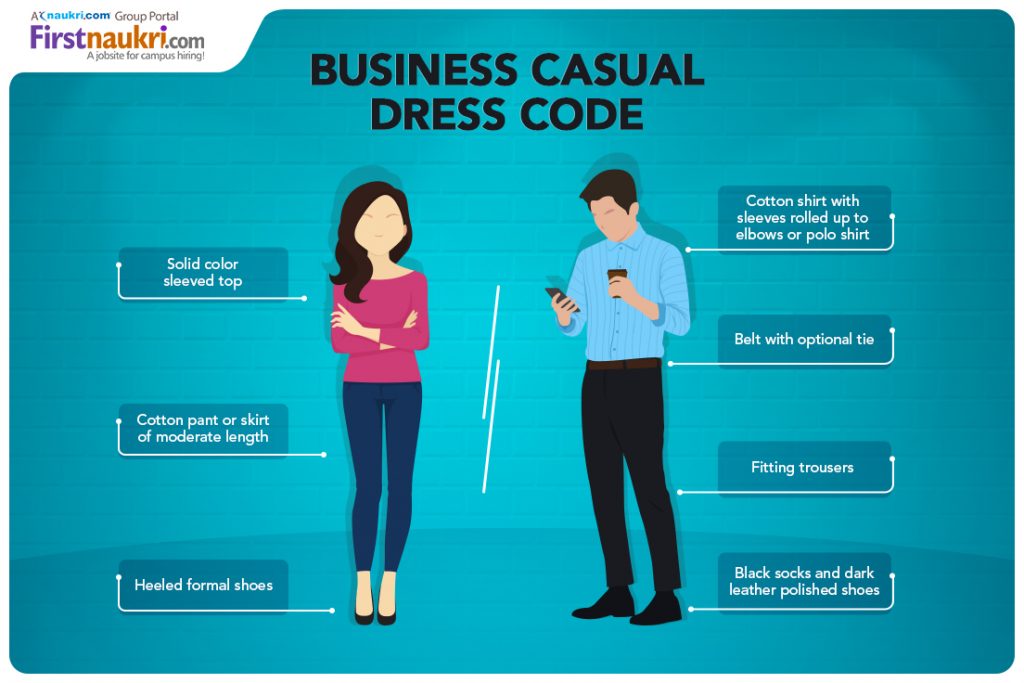
- This dress code typically requires males to wear khakis or pants with a collared shirt. Usually, ties are optional. Dress shoes or loafers round off the whole look.
- Dress skirts or pants can be worn by women with sweaters or shirts. Finding the ideal balance between professional and informal attire is crucial when selecting apparel.
Casual Dress Code
Casual attire may be the standard in certain creative or entrepreneurial workplaces. This dress code offers the most flexibility and allows individuals to express their personal style. Casual, however, need not be careless or unprofessional. Maintaining a neat and put-together appearance is still crucial.
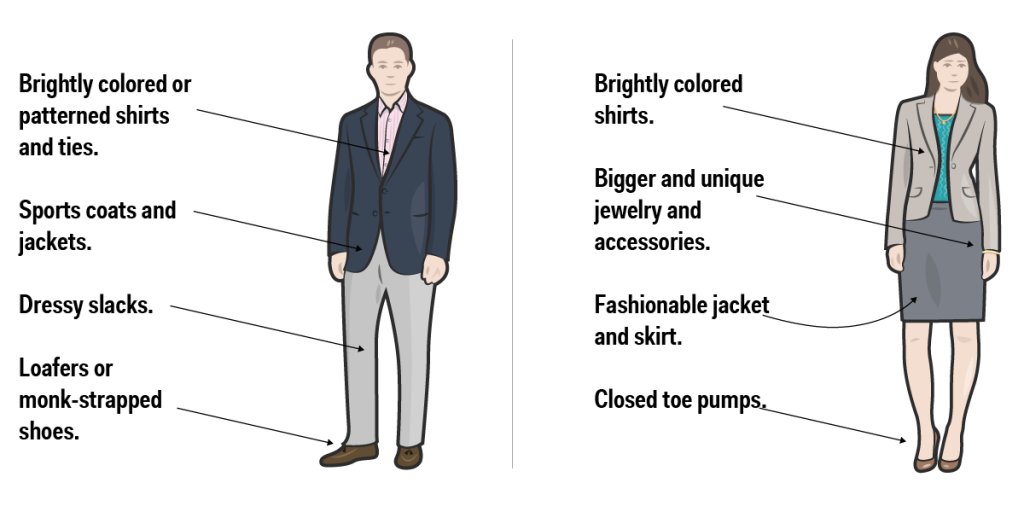
- It’s important to avoid anything too exposing or worn out, even though jeans and T-shirts could be acceptable.
- Choose well-groomed, relaxed attire that showcases your individual flair while projecting a sense of professionalism.
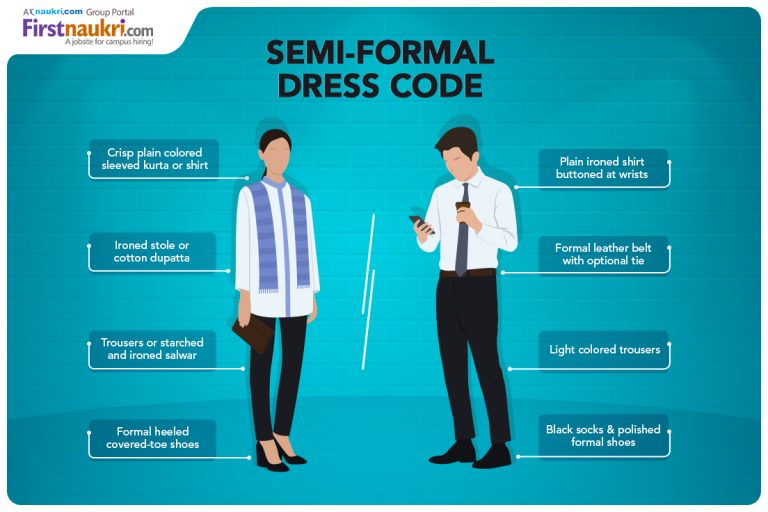
Dressing professionally for interviews might make you stand out from the pack in the cutthroat world of job searching. Your appearance conveys not just your professionalism but also your awareness of the corporate culture and your dedication to leaving a good first impression.
It’s important to keep in mind that every sector and organization may have somewhat different requirements, so it’s wise to investigate the dress code and adjust as necessary.
Related Interview Preparation Reads:
- Tell me about yourself.
- Why do you want this job?
- What are your strengths?
- What are your salary expectations?
- What is your ideal company?
FAQs on Interview Dress Code for Females and Males
What should be the dress code for females in a job interview?”
Females should opt for a tailored suit, a knee-length dress, or a skirt paired with a conservative blouse. Closed-toe heels and minimal accessories complete a polished and professional interview look.
What is the best interview attire for males?
The best interview attire for males includes a well-fitted suit in classic colors, a light-colored dress shirt, a tasteful tie, polished leather shoes, and well-groomed grooming.
Can I wear jeans to a job interview?
In some industries, jeans might be acceptable, but it’s safer to opt for business casual or formal attire. Jeans can come across as too casual for most interview settings.
Are open-toe shoes okay for interviews?
Closed-toe shoes are recommended for interviews, as they maintain a professional appearance. Open-toe shoes might be seen as too casual or inappropriate, depending on the company culture.
What colors are suitable for interview clothing?
Stick to classic colors like navy, black, gray, and white for interview attire. These colors convey professionalism and are less likely to be distracting or make you stand out for the wrong reasons.
Latest Posts
Top Skills in Resume For Freshers – 2026 Detailed Guide
Creating a compelling resume as a fresh graduate can be a daunting task, but it’s also your ticket to landing your dream job. One of the key elements that can…
Step-by-Step Guide: How to Become a Mechanical Engineer
Mechanical engineering stands as one of the most versatile and in-demand engineering disciplines globally, offering exciting career opportunities across diverse industries. For college students and recent graduates in India, understanding…
What is Upskilling? – Meaning, Benefits and Tips to Upskill
Being ahead of the curve is more crucial than ever in the ever-changing world of today. This requires ongoing skill development and technological adaptation. This entails upskilling or reskilling for…
Top 10 Do’s and Don’ts For Your First Job
Looking for a new job can be a daunting task, especially if you’re a fresher. There are so many factors to consider, from the type of job you want to…
Popular Posts
Best CV Formats for Freshers: Simple, Professional & Job-Winning Templates
Creating an effective CV (Curriculum Vitae) is the first step towards landing your dream job or internship as a fresh graduate. Your CV is your initial introduction to potential employers…
100+ Quantitative Aptitude Questions for Placement with Answers
Quantitative aptitude questions play a crucial role in campus placements, competitive exams, and entry-level job interviews. Whether you are preparing for your first job interview, an aptitude test for placement,…
How to Start an AI Career in India: Skills and Future of Work
Artificial Intelligence (AI) is revolutionizing industries worldwide. From automating routine tasks to enabling self-driving cars and intelligent healthcare diagnostics, AI is reshaping the future of work. For college students and…
How to Write Mail for Job Application – Explained
A job application email is a professional email that you send to a potential employer to express your interest in a job opening. It is typically accompanied by your resume…
How to Write a Job Application Letter (With Samples)
When it comes to applying for your first job, making a great first impression is crucial. As a recent graduate, you might feel a little intimidated by the idea of…
